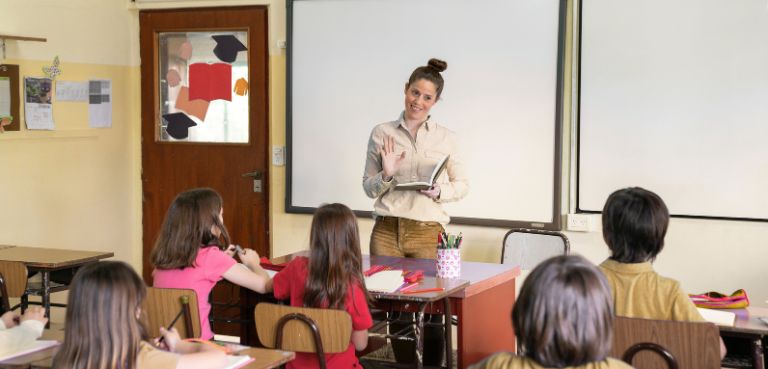No products in the basket.
When people ask, What do you need to be a primary school teacher, they quickly realise that early schooling shapes a child’s whole future. Primary teachers guide each step: teaching reading, writing, and maths while helping children grow imagination, friendships, and emotional skills. To join this profession, you’ll need the right skills and documents first.
So, in this blog, we’ll take a closer look at the different steps to become a primary school teacher. We’ll cover the needed papers, the safety checks, and the skills that will help you do well in this job. Let’s explore all the key facts you need to begin your journey to becoming a teacher.
What Does a Primary School Teacher Do?
A primary school teacher guides the early learning and growth of young children. They plan lessons, teach subjects like science, maths, and English, and create fun tasks that build clear thinking. Beyond teaching core subjects, they help children become more confident. They also teach them to solve problems and work well with others.
Teachers talk with parents, check each child’s progress, and give helpful advice. These steps help each child improve. Additionally, they make the classroom a warm, friendly, and safe place to learn. Above all, they create a lifelong love of learning. That love forms a steady base for later life.

What Do You Need to Be a Primary School Teacher
When people ask what you need to be a primary school teacher, they’ll find there are certain papers that prove you are ready in the UK. First, you must get a degree. You have two main paths: a Bachelor of Education in Primary Education or a degree in another subject plus a Postgraduate Certificate in Education (PGCE). Now, let’s look at these papers in more detail:
1. Bachelor’s Degree in Education (Primary Education)
Primary Education is the most common degree for those who want to teach in primary schools. This degree covers lesson design, class control, and child growth. The degree normally lasts three to four years and includes real teaching time. In the end, this paper gives you the knowledge and skills needed to teach students aged three to eleven.
2. Degree in Another Subject
Even if your degree is not in education, you can still become a teacher. For example, you can earn a postgraduate certificate in education (PGCE) after completing a degree in a subject like English, maths, or science. This will give you the teaching paper you need. It’s a great option for those looking to switch careers and move into teaching.
3. Postgraduate Certificate in Education (PGCE)
If you already hold a degree in a different subject, you can take a PGCE. This is a one‑year course that prepares you for teaching. It mixes study with real classroom time. If, for example, you already have a degree in a subject like English, maths, or science, the PGCE can be a strong path. It will help you change into a teacher.

What is Qualified Teacher Status (QTS)?
Qualified Teacher Status (QTS) is a qualification that lets you legally teach in state‑run schools in England. The goal of the QTS check is to make sure teachers have the right skills, knowledge, and know‑how to teach students well.
To earn QTS, you must finish an approved teacher‑training course, which blends study, work and class practice. Most courses mix university study with hands‑on time in schools. This mix lets you gain real‑world skills.
Once you get QTS, you are seen as a fully trained teacher and can start teaching full‑time. However, QTS does not last forever. You must renew it from time to time, and you will need to keep up with learning throughout your whole career.
What Are the Safety Checks?
Before you can work as a primary school teacher, you must pass safety checks to prove you can work with children. The Enhanced Disclosure and Barring Service (DBS) check is the main one. This check is required for anyone working with children or at‑risk adults. It gives a full record of any crimes or warnings that might affect their work in a school. The enhanced check plays a key role in keeping children safe. Schools can be sure that all staff meet the highest levels of trust and care.

Other Training for Primary School Teaching
While getting a degree or completing a PGCE is the main way to become a primary school teacher, other courses can grow your skills and help you focus on certain areas of teaching. Some extra courses and papers are listed below.
- Special Educational Needs (SEN) Training – These courses help teachers learn how to support children with disabilities or learning problems, so they get the best learning possible.
- Master’s in Education (MEd) – After gaining time in the classroom, some teachers choose to take a Master’s to improve their skills. This step can open doors to lead roles or work with children who have extra needs.
- Leadership and Management Courses – If you want a lead role, think about courses that teach how to run a team, carry out school rules, and push for better teaching and learning.
Skills to Do Well as a Primary School Teacher
- Patience and Care – Working with children needs calm and kindness. Every child learns at their own speed. Staying patient and helpful is vital.
- Clear Talking Skills – You must speak well and listen well. These skills help you teach lessons and keep parents up to date.
- Organisation and Time Use – You will plan lessons, manage the class, and handle paperwork. Being tidy and managing your time will keep the class running smoothly.
- Creativity and Flexibility – Good teaching needs creative ideas. Creative ideas keep children interested. You must change lessons to fit different ways of learning.
- Teamwork – Teaching is not done alone. You work with other teachers, staff, and parents. Working together builds a strong learning space.

Conclusion
When you ask what you need to be a primary school teacher, you’ll find it takes more than a love of working with children. It calls for effort, patience, and ongoing learning. You need the right papers, training, and personal skills to thrive in the classroom. Each step—earning a degree, gaining QTS—prepares you for the challenges and joys of the job.
Safety checks are key to make sure all teachers meet the rules to work with children. Beyond papers, clear speaking skills, flexibility, and the power to spark young minds are just as vital. Build these skills along with your study. And you will grow into a sure and strong teacher.
Frequently Asked Questions (FAQS)
What is the pay of a primary school teacher?
Pay in the UK starts near £25,000 a year for new teachers. Pay can rise to about £40,000 or more with time.
Do you need to be great at maths to teach primary?
You do not need expert‑level maths, but you need a sound grasp of basic maths to guide children in sums and problems.
How long does it take to become a primary school teacher?
A degree in Primary Education takes three to four years. If you already hold another degree, a PGCE adds one year. So the path is about three to four years overall.
Is teaching a rewarding job?
Yes. Seeing children grow and learn new skills is deeply rewarding, and teachers can make a real change in a child’s life.




